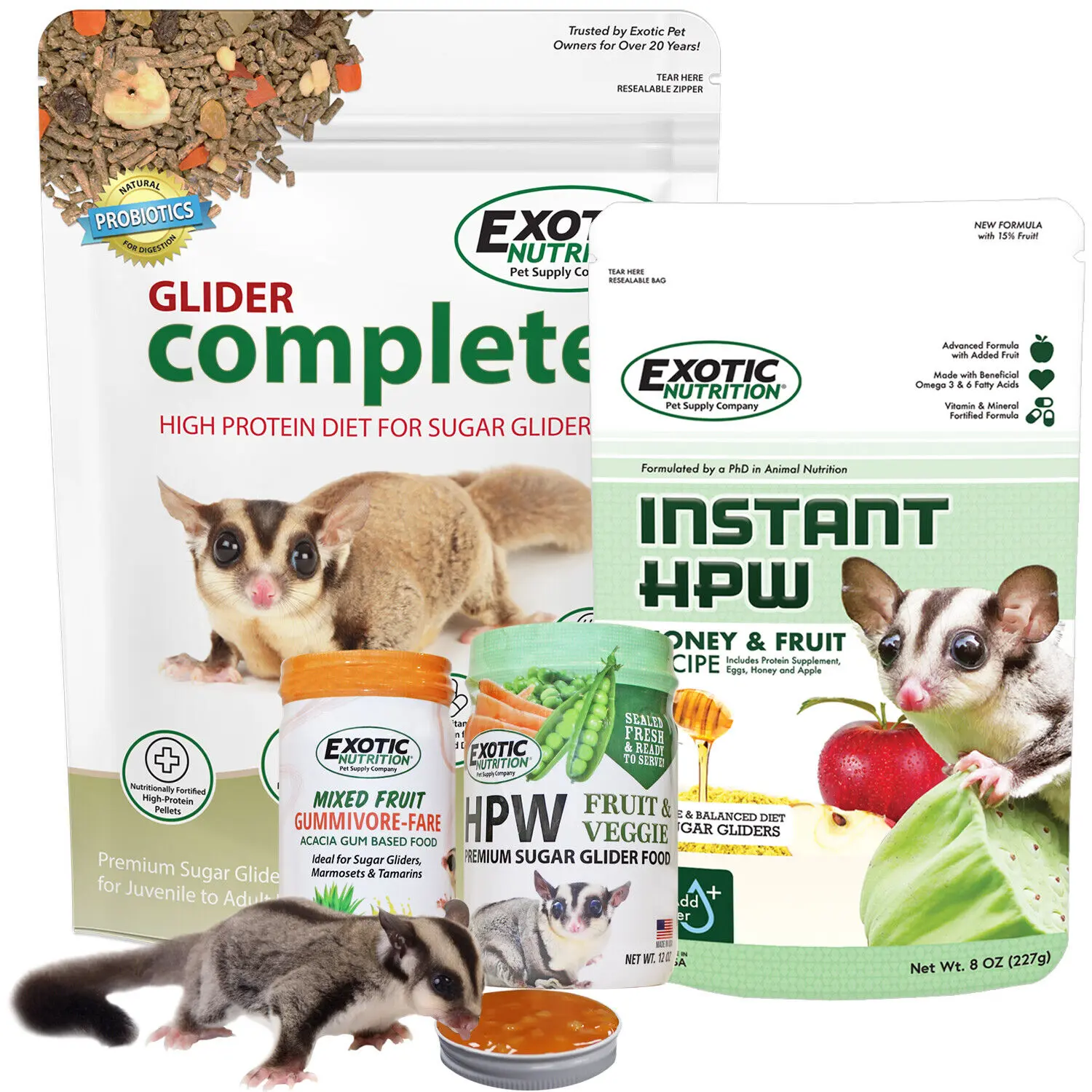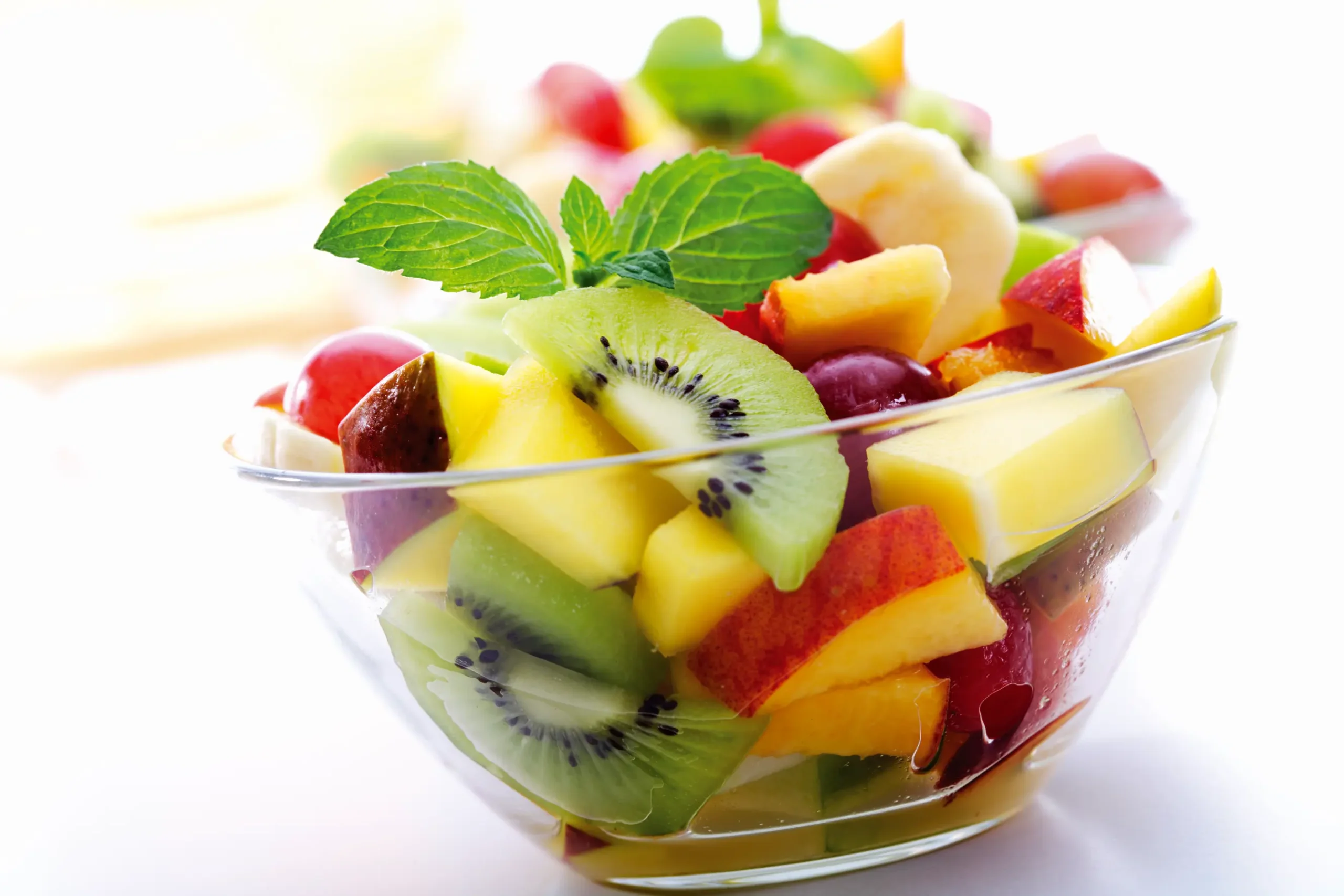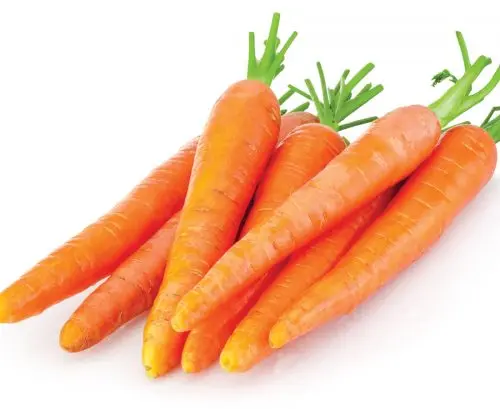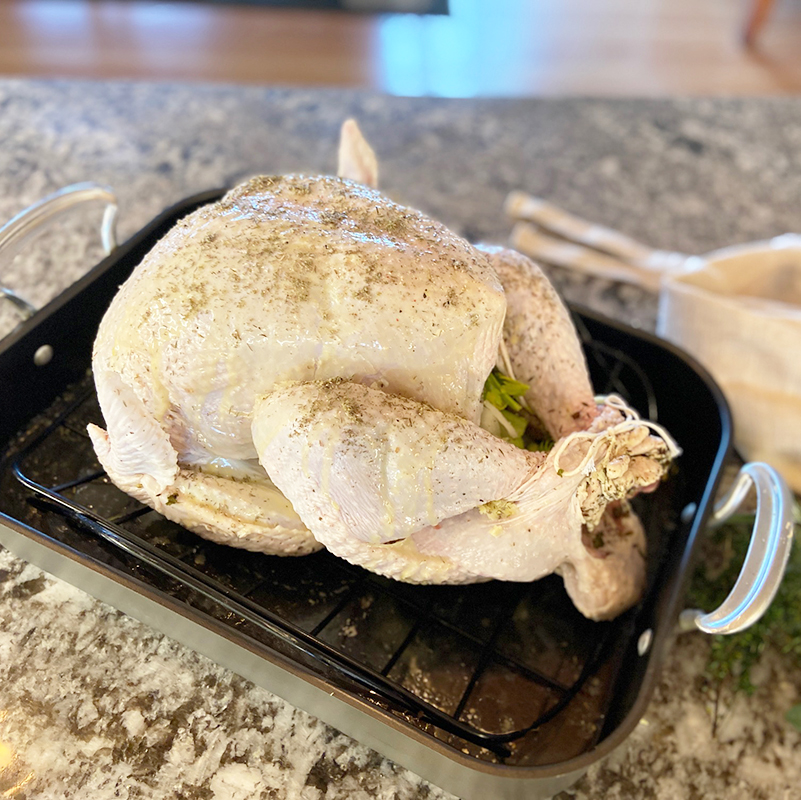Sugar gliders are small, omnivorous marsupials that require a balanced and varied diet to thrive. Providing your sugar glider with the right nutrition is essential for their health and well-being. In this blog post, we’ll explore the various foods that sugar gliders can eat, their nutritional value, and how to create a balanced diet for your glider.
Specially-Formulated Sugar Glider Pellets

Commercial sugar glider pellets provide a balanced and nutritious base for your pet’s diet. These pellets are formulated with the essential vitamins, minerals, and nutrients that sugar gliders require. Make sure to choose a high-quality brand and follow the feeding guidelines on the package. You can check out this 4-in-1 combo available on eBay.
Fresh Fruits

Fruits are a natural source of vitamins and minerals, making them an excellent addition to your sugar glider’s diet. Some recommended fruits include:
- Apples
Rich in fiber and vitamins A and C, apples are a sweet treat for your sugar glider. Make sure to remove the seeds, as they can be toxic. - Bananas
Packed with potassium and vitamin C, bananas are a soft, easy-to-eat option. Use them sparingly, as they are high in sugar. - Grapes
High in antioxidants and vitamins C and K, grapes can be an occasional treat. Remember to cut them in half to prevent choking hazards. - Mangoes
A tropical delight, mangoes offer vitamins A, C, and E, along with fiber. Remove the skin and pit before serving. - Berries (strawberries, blueberries, raspberries)
These antioxidant-rich fruits provide essential vitamins and minerals, including vitamin C and vitamin K. - Kiwi
High in vitamin C and potassium, kiwi is a healthy fruit option for sugar gliders. - Mango
Mangoes are rich in vitamins A and C, promoting a healthy immune system for your sugar glider. - Melons
Melons, such as cantaloupe and watermelon, provide hydration and essential nutrients like vitamins A and C. - Papaya
This tropical fruit is a good source of vitamin C, vitamin A, and dietary fiber. - Peaches
Peaches offer vitamins A and C, as well as potassium. Remove the pit before feeding to your sugar glider. - Pears
Pears provide fiber, vitamin C, and potassium. Be sure to remove the seeds before offering them to your sugar glider. - Pineapple
Rich in vitamin C, pineapple is a tasty treat for sugar gliders. Be sure to remove the tough core and cut it into small pieces. - Plums
Plums are high in vitamin C, vitamin K, and dietary fiber — a great addition to your glider’s diet.
Vegetables

Vegetables provides essential nutrients and fiber for your glider, and promotes a healthy digestive system. Some vet-approved vegetables for sugar gliders include:
- Carrots
A crunchy, vitamin A-rich snack, carrots are great for your sugar glider’s eye health. - Sweet corn
Offering vitamins A, B, and C, sweet corn is a tasty treat that can be served cooked or raw. - Sweet potatoes
Packed with vitamins A and C, sweet potatoes are a nutritious and delicious option. Cook and mash them for easy consumption. - Bell peppers
Bell peppers are rich in vitamin C, vitamin A, and antioxidants, making them a nutritious vegetable option for sugar gliders. - Peas
High in vitamins A, C, and K, peas are a versatile addition to your sugar glider’s diet. - Squash
Squash, including zucchini and pumpkin, provides vitamins A and C, as well as dietary fiber. Cook and cut into small pieces before offering them to your sugar glider. - Leafy greens (spinach, kale, collard greens)
These nutrient-dense vegetables are high in vitamins A, C, and K, as well as calcium and iron. Offer small amounts to your sugar glider, as excessive consumption can lead to digestive issues.
Protein Sources

Sugar gliders require protein to support their growth and energy levels. Some suitable protein sources include:
- Insects
Mealworms, crickets, and other insects are a natural source of protein for sugar gliders. Purchase these from a reputable supplier to ensure they are safe for consumption. - Lean Meat
Small amounts of cooked, lean meats like chicken or turkey can be included in your sugar glider’s diet. - Bird eggs
Quail eggs or small pieces of cooked chicken eggs can be offered as a protein-rich treat. - Nuts and seeds
Nuts and seeds are rich in protein, healthy fats, and various micronutrients, making them a nutritious addition to a sugar glider’s diet. Examples of nutritious seeds to feed your glider include almonds, sunflower seeds, pumpkin seeds. - Legumes
Legumes are plant-based protein sources that also provide fiber, vitamins, and minerals. They can be a healthy alternative to animal-based proteins for sugar gliders. You can try cooked beans, lentils or chickpeas to see which one your sugar glider likes most.
Always make sure that any meat fed to your sugar glider is cooked thoroughly and free of any seasonings or additives.
Foods to Avoid
Certain foods can be harmful to sugar gliders, so avoid feeding them chocolate, onions, or anything high in fat or sugar. Also, steer clear of fruits with large seeds or pits, as they can cause choking hazards or contain toxic compounds, which are fatal to sugar gliders.
Frequently Asked Questions
1. What is a balanced diet for sugar gliders?
A balanced diet for sugar gliders should include a variety of fruits, vegetables, proteins, and a sugar glider-specific pellet or staple diet. It’s essential to provide a diet that meets their nutritional needs, including vitamins, minerals, and appropriate amounts of sugar and fat.
2. What fruits can sugar gliders eat?
Sugar gliders can eat a variety of fruits, such as apples, bananas, berries (e.g., strawberries, blueberries), grapes, kiwi, mango, papaya, and melons. Make sure to remove any seeds or pits and cut the fruit into small, manageable pieces. Keep in mind that fruits should be fed in moderation due to their high sugar content.
3. What vegetables can sugar gliders eat?
Sugar gliders can eat a variety of vegetables, including leafy greens (e.g., spinach, kale, romaine lettuce), carrots, sweet potatoes, bell peppers, and green beans. Be sure to wash and cut vegetables into small pieces before offering them to your sugar glider.
4. What proteins can sugar gliders eat?
Protein sources for sugar gliders include insects (e.g., mealworms, crickets), boiled or scrambled eggs, and lean, cooked meats (e.g., chicken, turkey). Insects are a particularly important protein source, as they also provide essential nutrients like calcium.
5. What commercial foods are suitable for sugar gliders?
Vet-approved, sugar glider-specific pellets or staple diets are available from reputable pet stores or online retailers. These commercial foods are formulated to meet the nutritional needs of sugar gliders and should be offered as part of a balanced diet that includes fresh fruits, vegetables, and proteins.
6. Can sugar gliders eat nuts and seeds?
Sugar gliders can eat small amounts of nuts and seeds, such as almonds, walnuts, and sunflower seeds. However, these should be offered in moderation, as they are high in fat and can contribute to obesity if fed in large quantities.
7. Are there any foods that should be avoided or are toxic to sugar gliders?
Avoid feeding your sugar glider chocolate, caffeine, onions, garlic, avocado, and fruit pits or seeds, as these can be toxic to them. Also, refrain from offering your sugar glider any processed or sugary human foods, as they can lead to health issues.
In conclusion, providing your sugar glider with a balanced, vet-approved diet is essential for their overall health and well-being. By following the guidelines provided in this FAQ, you can ensure that your sugar glider enjoys a variety of nutritious foods that meet their dietary needs.
Final Words
To recap, a balanced diet for your sugar glider is one that consists of sugar glider pellets, fruits, vegetables, and a mixed a protein source like chicken, legumes and nuts. These will keep your sugar glider healthy and satisfied.
Always remember that advise given here is not meant to replace professional veterinary advice. Please always consult your veterinarian for the final say in your sugar glider diet.
